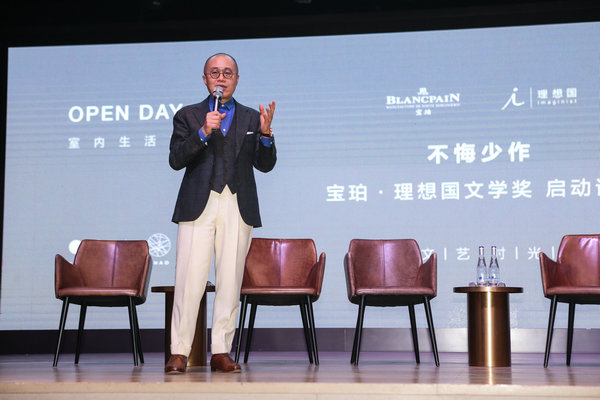 |
|
Liang Wendao, writer and host of the opening ceremony of the Blancpain-Imaginist Literary Prize 2018. [Photo provided to China Daily] |
Based on civilian life in Shanghai and written in the local dialect, Fan Hua (Blossoms), which he wrote in his sixties, finally won him one of China's highest literary honors, the Mao Dun Literature Prize in 2015.
One question often brought up in literary circles is that whether it is suitable to look at the maturity of an author's writings using a biological model, which can often lead to speculation of the immature nature of a writer's early works.
"I think literary writing is not a career for the precocious," says Tang Nuo, 60, a prizewinning writer and cultural critic from Taiwan. "I see literature as a profession, which requires the long process of learning and practice."
In Tang's opinion, to write a novel, a writer should put in the time and effort, run with the crowd-to discover, experience, acquire, confirm and understand-the world around them before reaching their literary prime in later life.
"Do not expect to be able to bring out the one great work that can define your life by the age of 45," Liang warns.
Echoing Tang's words, Gao Xiaosong, 49, a genre-defying intellectual whose music has made its way into literary recognition, made a further interpretation: "Art consists of two parts. One is the profession that Tang has mentioned, and the other is the artists' inner world."
Gao compares the process as opening a door, and the inner world as the "demons" behind the door. As some writers were growing up, the tiny "demons"-especially those of love and adolescent blues-break out when the door opens just a little, and on occasion they are able to accomplish works of genius. However, as the door opens wider and wider as people grow older, and when the "demons" no longer possess the vigor to squeeze out, some writers find it painful to discover that there are no major demons at all-the ones that could have lead them to success.
Comfort may bring happiness, yet it may not help create good literature. As Tang has pointed out, writers in the mainland may now have a better fortune than their peers worldwide, but they also face deeper difficulties in digging up stories that can still touch hearts.
Every generation has their "demons", according to Xu. "Writing literature is to face one's life and dignity, and thus confront the essence of human nature. And there are demons, the demons that I understand."
As Liang concludes, we still have collective experiences and the narratives of our times. "If a whole generation is rushing to acquire cars and houses, it is a great collective experience and a story that is worthy of being told."
Contact the writer at fangaiqing@chinadaily.com.cn